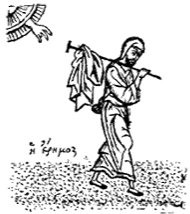Why are we here?
Many people plainly suppose we are here to seek pleasure. A high school friend used to say “we’re just two ends of a gastrointestinal tract.” A hotel co-worker said sex was what made life worthwhile.
This is the perspective of an animal or a robot. It is also a will-o-the-wisp. Without hunger, food does not satisfy. Without abstinence, sex is just work. It all becomes addiction, and pleasure is gone.
Some people think life is about achieving “success.” Success here means power and social authority over other people. This is actively active evil. And it certainly does not lead to contentment. “Uneasy is the head that wears the crown.”
Some people say that life is about having children, and giving them a start in life. This is the Darwinian perspective; the Bible too does say “go forth and multiply.” Kids are part of our job, at least. But it does not entirely satisfy. If your life is meaningless, so are your children’s lives.
Some people say life is about sacrifice of self to the collective: one owes ultimate allegiance to one’s parents, one’s community, and one’s homeland. “Dulce et decorum est pro patria mori.” But this is idolatry: one’s nation, one’s government, or one’s parents can be either good or bad. This leads to “good Germans,” Fascism, racism, and nepotism.
Some say that life is about going about doing good to others. And it is, in detail: we are to clothe the naked and feed the hungry, when we encounter them. But this can easily become a form of ego-worship. The Bible warns that if we do good and are seen to do good, we already have our reward; we are acting in self-interest. God does not need you to save the world; realistically, things are already going as he intends. I suspect figures like Mother Teresa.
The meaning of life is to seek the true, the good, and the beautiful.
This is necessarily so, because truth, beauty, and good are the only things of value in themselves. They do not derive their value from anything else, and everything else is valuable only to the extent that it is true, good, or beautiful.
These values can be falsified and misunderstood. People often confuse beauty with sexual allure, for example. People misconstrue fact as truth, truth as fact. Facts are only one form of truth, and a trivial form. And people misrepresent goodness in many ways.
It is not public charity. It is also not being “nice,” and getting along with everyone. That requires having no principles, and giving everyone what they want. This is, at best, moral cowardice, at worst devious self-interest. It requires aiding and abetting evil whenever it appears.
True good is justice. Not to be confused with the current leftist concept of “social justice,” a euphemism for injustice. Justice means giving everyone what they deserve on their merits.
How does one, in practical terms, do this?
First, in art. Good art manifests beauty. Art is adding beauty to the world. This is an intrinsic good, even if no other mortal sees this beauty. God does, and with him you are building the New Jerusalem, which the Bible describes to us as a vast work of art. But if possible, the Bible also tells us to “let your light shine,” and be a leaven to those around you.
Good art must also be true. As Keats said, “truth is beauty, beauty truth; that is all ye know, and all ye need to know.” One may speak truth outside of art, but inside of art, you must. And speaking truth outside of art can be dangerous. Jesus warned: “Do not give dogs what is sacred; do not throw your pearls to pigs. If you do, they may trample them under their feet, and turn and tear you to pieces.” So he spoke in parables. Art is intended, as Emily Dickenson said, to “tell all the truth, but tell it slant. Success in circuit lies.” Those who have eyes to see, will see.
Good art must also serve justice. We are aware of this when, for example, we read or watch a play. We will rebel, intellectually and emotionally, whether watching tragedy or comedy, if the resolution does not serve justice. Karma must come around. No cheap happy endings, and no gratuitous deaths.
Beyond art is something more: the practice of a religion. To bind yourself to a religion is, in effect, to make your life a work of art. Art shows the way; religion IS the way.
But there is no just going through the motions here, no “church on Sunday,” no hypocrisy. We are talking of full commitment, of “prayer without ceasing.” That is the ultimate. That is sainthood.













No comments:
Post a Comment